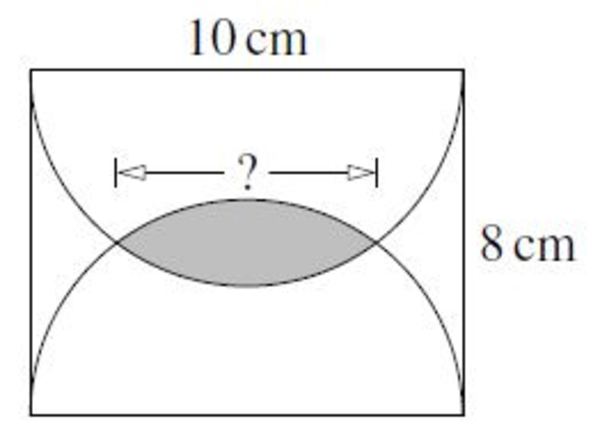What is the overlap width of these two semicircles?
 Two similar (rotated) semicircles are drawn in a rectangle as shown.
What is the width of the overlap of the two semicircles?
Two similar (rotated) semicircles are drawn in a rectangle as shown.
What is the width of the overlap of the two semicircles?
Source: Paralell
This section requires Javascript.
You are seeing this because something didn't load right. We suggest you, (a) try
refreshing the page, (b) enabling javascript if it is disabled on your browser and,
finally, (c)
loading the
non-javascript version of this page
. We're sorry about the hassle.
1 solution
You can solve x 2 + y 2 = 5 2 and x 2 + ( y − 8 ) 2 = 5 2 , where x = ± 3 c m and y = 4 c m .
Log in to reply
Epic! I 95% get you
How do you get y=(y-8)?
Log in to reply
Those equations describes two circumferences of radius 5 c m with its origins displaced 8 c m along the vertical axis. You can solve for y computing the difference between both and then solve for x .
Let me know if you understand it! 😁
Log in to reply
@Sebastián Vidal Romero – Thank you - I think I remember the equation now :)
To make it easier to explain, let's assign letters to the points. Let P, Q be the midpoints of the longer sides of the rectangle. Let R, S be the points where the semicircles meet. Let T be the point where PQ meets RS.
Each of the semicircles has a radius of 5 cm. Therefore PR, PS, QR and QS all have length 5 cm. Therefore PSQR is a rhombus. Hence the diagonals PQ and RS bisect each other at right angles. It follows that PT and QT each have a length of 4 cm. Let the common length of RT and ST be x cm.
We now apply Pythagoras’ Theorem to the right-angled triangle PTR. This gives 42+x2=52, and hence x2=52−42=25−16=9. Therefore x=3. It follows that both RT and ST have length 3 cm. Hence the length of RS is 6 cm. Therefore the width of the overlap of the two semicircles is 6 cm.